Reading "Second Treatise of Government," by John Locke
Threadable-adjacent reading discussion on land ownership
The most recent Threadable reading* for Land Ownership was a selection from John Locke’s 1690 book Second Treatise of Government, Chapter V: Of Property.
*(https://threadablenative.page.link/Rxp8yegeZ1vXy4u19 if you want to try the Threadable app and need the link! Only works on iOS/Apple devices for now.
For anyone new to On the Commons an overview of this project is here. Please feel free to comment or email me with any questions.)
Locke’s Treatise is in the public domain, and there are many different places online where you can read the text. I have a hard copy (my eyes are always tired from copy editing, so hard copies tend to be my go-to), but there are online PDFs, such as this one from the University of York. The link in the first paragraph is to the Project Gutenberg ebook version.
It’s hard to know where to start with John Locke because, as with William Blackstone in the previous reading, his ideas about the basis of private property, especially private ownership of land, are both foundational and surprisingly shaky.
Locke’s idea was that men (only men, of course, and only white men I’m sure) gained ownership of land by “mixing” their labor with it: planting, tilling, harvesting, that kind of thing. Basically, once you worked the land you could claim it as your own.
That’s not actually nothing. He spends a fair amount of time dwelling on what happens in the space between, say, a piece of fruit hanging on a tree and its location in your hand, at which point it is “yours” to eat. Or is it? It’s actually a curious philosophical question. I’ve personally spent a lot more time thinking about what effect one’s private ownership of land, food, water, etc., has on other people. How much land can you claim for yourself before it deprives others of their right to survival? What property rights can you exercise before it start to erode others’ rights?
The fact of when something becomes “yours” feels a little different, more philosophical but also tangible. I can’t claim the pie cherries from my neighbor’s cherry tree no matter how many cherries I could personally pick—and despite the fact that they’re rarely in town when the cherries are ripe—because the tree isn’t mine. Yet when I gather chokecherries along the public paths in town, I transfer public claims over that fruit to my own private use and benefit. And to the benefit of whoever receives the chokecherry jelly I make.
(Also I deprive the bears of food. Or maybe they deprive me of food. I’m not sure, but publicly owned fruit trees and wildlife is an issue I’m having to think about now that I’m on the city’s Parks Board.)
So it’s not simply, as one Threadable reader pointed out, the Locke sees the mixing of labor as the first element of ownership, but the question of how one justifies claiming resources, such as food, for oneself—a claim that is necessary to live.
Locke’s perspective is one I didn’t really pick up on in the reading and it had to be pointed out to me: that the ownership claim is an extension of claim over oneself. That people* have ownership of themselves, and their self-ownership extends then to the property they own, whether land or gold or cows. “The body of a person extends to include all of their possessions with use value,” as this commenter wrote. “Limbs and lambs and land.”
*(Remember, for Locke only white men are people, and likely only white men who are property owners to begin with are people—not an uncommon view; Immanuel Kant believed that only property owners and those who held public office could be considered citizens; anyone who worked for wages was in his view disqualified. It’s important to remember here that it’s been less than 150 years since any kind of non-landowner was allowed to vote, including men. Being a woman, I would not be considered a person in Locke’s eyes.)
I kind of wish I’d included Mary Wollstonecraft in these land ownership reading selections because she has some major critiques of Locke, and of private property in general, but am saving her for when I start writing the chapter on ownership of people for No Trespassing. However, there’s a great paper on her feminist critique of property (paywalled, unfortunately; just love the enclosure of knowledge we swim in) in which the author, Lena Halldenius, makes some acute observations about Wollstonecraft’s views of property:
“Property is a selfish principle, invoked by the rich under the false name of liberty in order to protect themselves against the claims of the poor,”
a principle that not only prioritizes the lives of the privileged, but also completely excludes women from ownership of anything, since in her time women never could own themselves. They were the property of men, a state that plenty of U.S. lawmakers would like to see us return to.
On Locke, Halldenius explains his view that,
“Land, originally held in common, can be turned into an object of private right through a performative act of appropriation. Labor is his term of choice for that act whereby a thing is acquired out of the common stock and turned into a person’s property.”
It’s a pretty succinct explanation, and exposes the problems that I had with Locke’s logic, which came down to three issues: 1) Like Blackstone, Locke several times says that nobody will ever claim more property or resources (like food) than they can actually use themselves, and therefore privatizing the commons for one’s own benefit doesn’t harm anyone else; 2) his definitions of land as “unused” or “waste,” which—again like Blackstone—he uses much of North America as an example of, claiming that it’s okay for colonizers to privatize land on that continent because the people who live there aren’t using all of it; and that 3) both subduing nature (Earth) and the command to labor come from God and are therefore unquestionable.
Point (3) came up in Blackstone, so I don’t really want to belabor the point that a command from God isn’t a good enough reference point for private ownership of land. Both he and Locke really tried to press that point, and on that basis alone it’s disturbing to me that much of our modern-day conceptions of property law still rely on their philosophies. But aside from that, even if you believed in the religious claims he’s making, it doesn’t logically follow that a divine command to labor mixed with the gift of Earth from God translates into private land ownership. There’s no there there.
Locke’s claim about it being “wrong” to take more land and resources than one needs, and that it won’t happen, is flat-out frustrating. You can say it’s wrong until the sun turns chartreuse, but it doesn’t stop people from doing it. Referring to that and his idea of “unused” or “waste” land, he tries several times to say that private claim over them is always achieved by “common consent.” He says this without, however, ever giving any actual evidence. Whose consent? When? How? Why would anyone who didn’t personally benefit consent to private ownership and gain rather than something more equitable?
One of the reasons it was so frustrating for me to read that was because everything he wrote about letting his horse chew grass, or tilling a certain field, or gathering acorns, is easily applied to a commons-based shared-use system. No privatization is required for any of it. Aside from which, he never addresses how this “common consent” happens, only that it does. Similar, again, to Blackstone, who said that it was “on all hands agreed” that land was made better use of when it was privatized. I bet those hands were not the ones doing most of the work on that land.
What he’s saying in this above quote—“there are still great tracts of ground to be found, which lie waste, and are more than the people who dwell on it do, or can make use of”—is that if colonizers anywhere in the world see land that they perceive to be unused, they have a right to take it. Which contradicts any waffle he makes about “common consent” anyway. Whose consent? I think we know the answer, but Wollstonecraft said it succinctly:
“It is only the property of the rich that is secure.”
And by extension colonial and imperial powers.
Dwelling on Locke’s philosophical question about when something becomes yours to consume or use or simply to keep is an interesting one. But none of his ideas either defend or effectively argue for private ownership in land. Aside from all the other logical inconsistencies, he never addresses the issue of how someone can “own” land that others do all the labor on. Why don’t the people working on a farm or great English estate own the land? Because—he never says this in this section but its reality might be somewhere else in the Treatises—their labor is also owned. It’s just self-justifying hierarchies all the way down.
Neither Blackstone nor Locke nor any of the other people with their money and influence and titles and centuries of reference can answer the essential question: Where did private property begin? And why?
You can take an apple from a tree, and then it’s yours. And we can debate about the philosophy that happens between the existing and the taking and the consuming. But to justify the reams of legal principles and decisions around private land ownership—especially when we remember previous readings about enclosures of the commons, the Christian Doctrine of Discovery, Johnson v. M’Intosh, and centuries of theft of Indigenous lands worldwide—we’re going to have to do a whole lot better.
I don’t think we can. After all these readings, “I took it; now it’s mine” is still all we’ve got going for private land ownership, and that is no basis on which to share an ecosystem, a planet, or a life.
Only two more readings left! Nick Hayes’s The Book of Trespass, and Mary Christina Wood’s Nature’s Trust: Environmental Law for a New Ecological Age. I’m afraid neither of these are in the public domain but both are well worth reading. Hayes’s book is particularly delightful. He’s an engaging writer and doesn’t hold back his low opinion of private ownership of large English estates and the theft they originated in. He also includes his beautiful ink drawings throughout the book.
I am once again going to be offline for several days, and will respond to comments, etc., when I return. Thank you for traveling with me on this weird journey. Please enjoy this photo off into the wilderness from a ski day I took with some friends last week. The snow ghosts and cloud banks were off the charts beautiful.

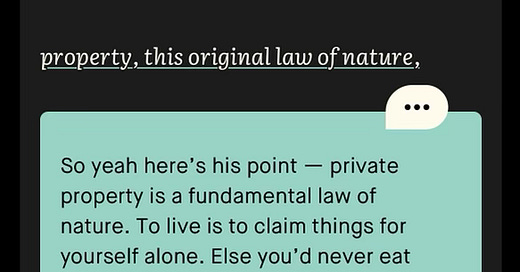



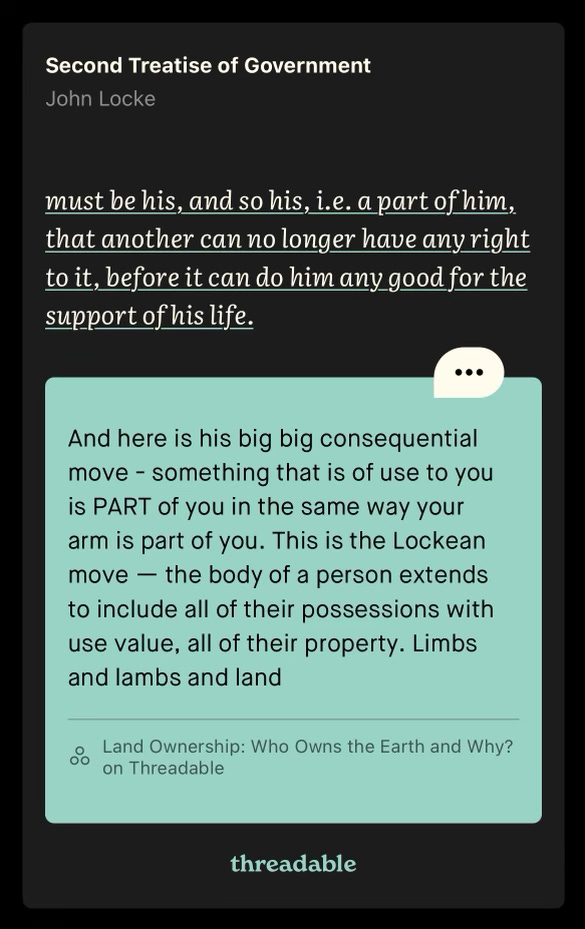
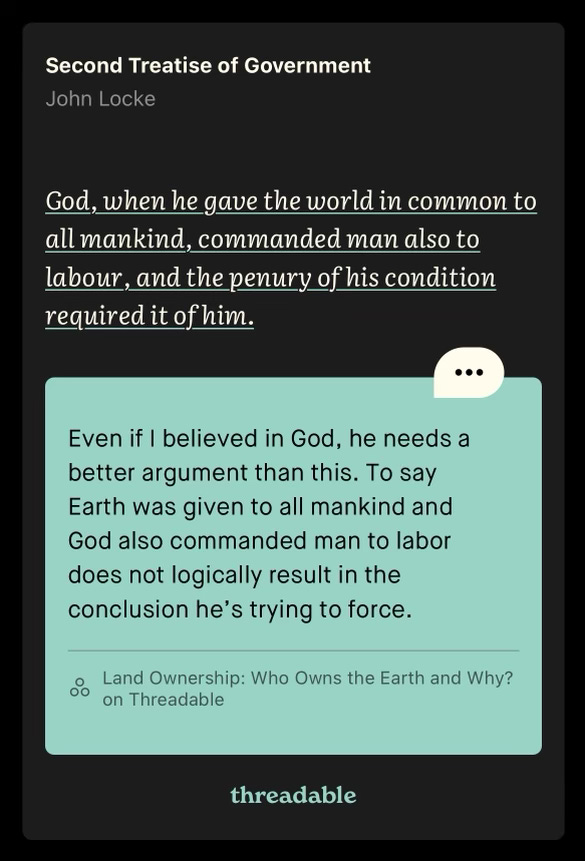
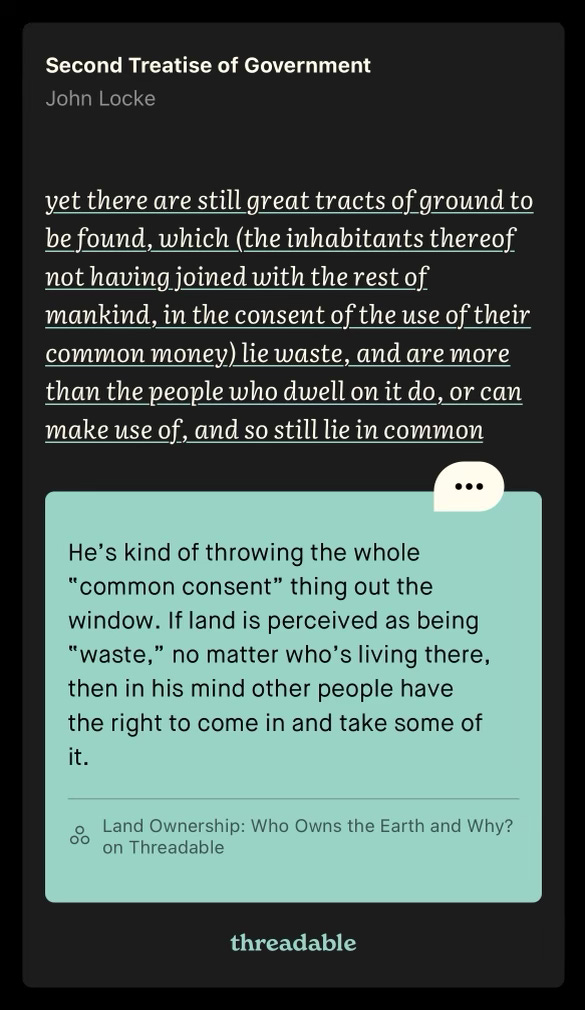
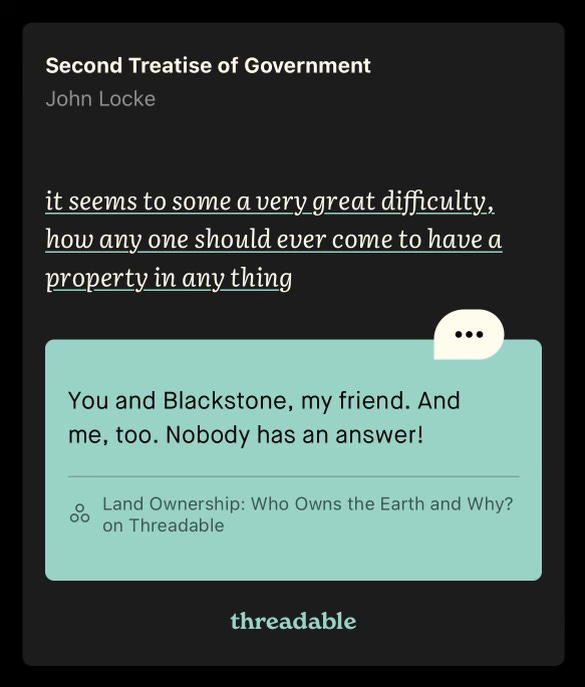
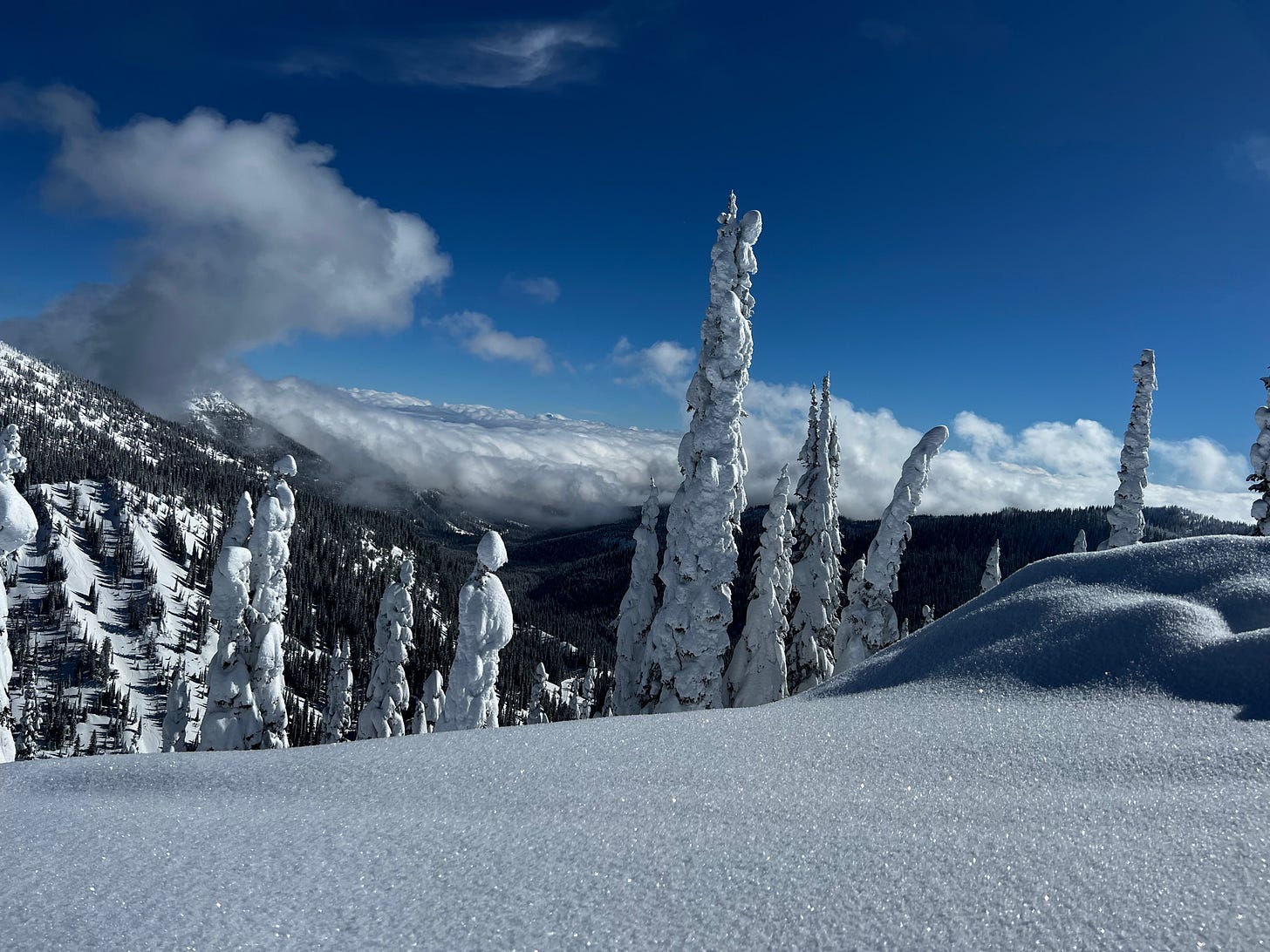
Please forgive my ignorance, but have you read/are you planning to read any Marx, Engels, or John Bellamy Foster on this? They certainly do address a lot of these issues in favor of abolishing private ownership, and Engels locates the origins property ownership squarely within the development of patriarchy and the ownership of women and children. Just a thought.
Thanks again for another illuminating essay. It's nice to have a concise reference as I'm certainly not going to delve into these texts! Just being honest about my laziness! ;)